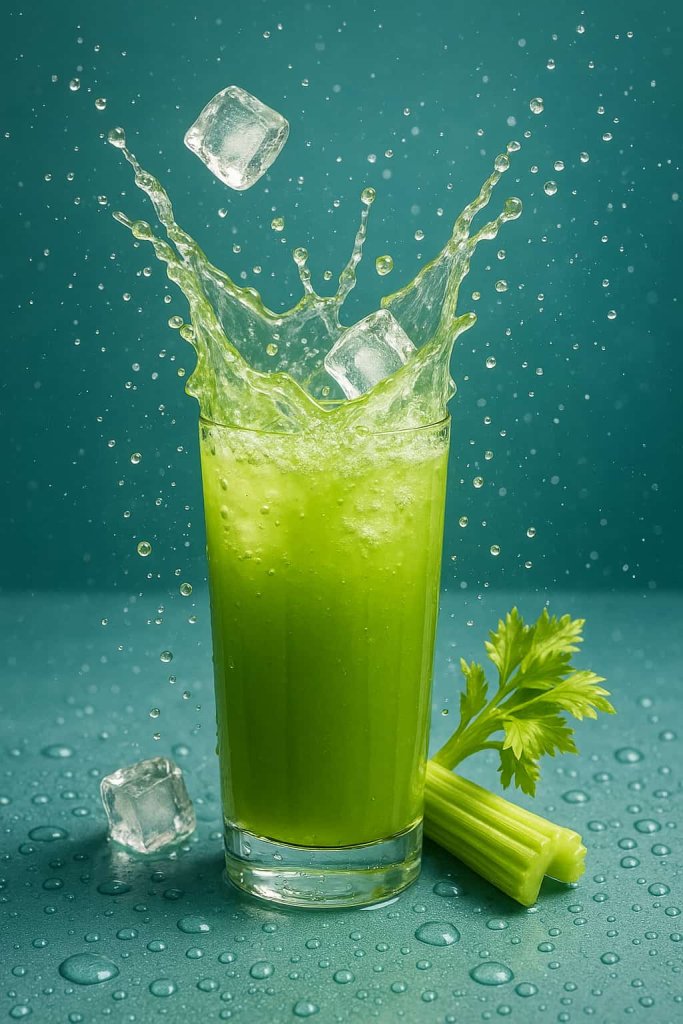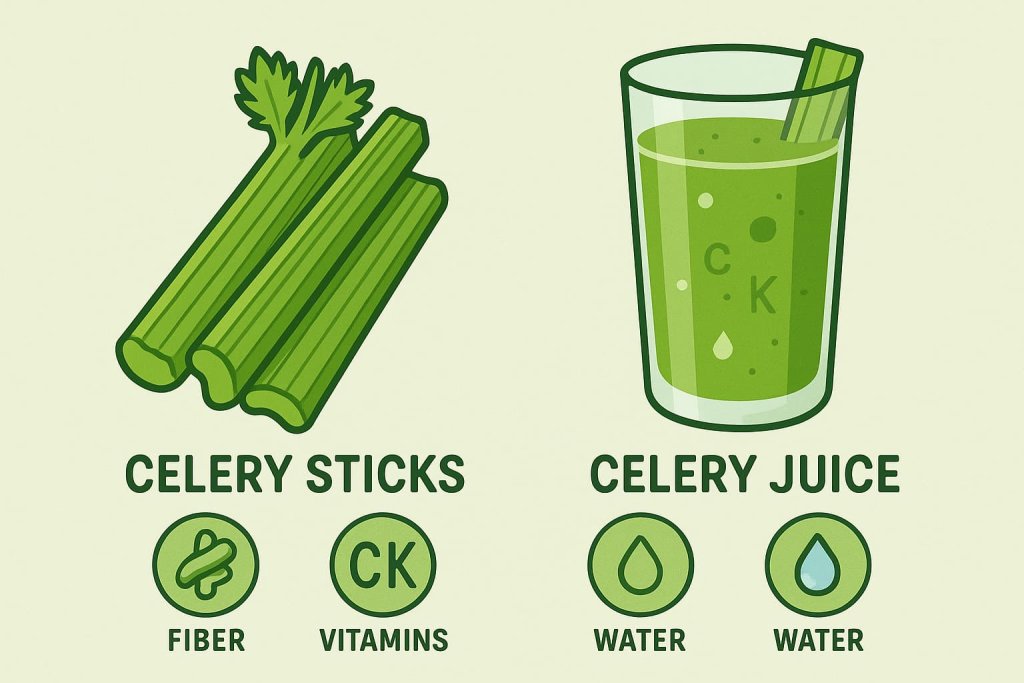Celery juice offers real health benefits — it supports hydration, heart health, and reduces inflammation — but it’s not a miracle cure.
In recent years, celery juice has become a wellness trend, but beyond the hype, research shows it’s a nutrient-rich beverage packed with antioxidants, electrolytes, and plant compounds that may genuinely support your body. Understanding the science behind its benefits helps you use it safely and effectively — without falling for misinformation.

Let’s explore the top 10 science-backed health benefits of celery juice, plus the right way to drink it, possible side effects, and FAQs.
What Is Celery Juice?
Celery juice is made by blending or pressing fresh celery stalks to extract the liquid.
It contains:
- Vitamins: A, C, K, and folate
- Minerals: Potassium, calcium, and magnesium
- Phytonutrients: Apigenin and luteolin (anti-inflammatory antioxidants)
- Hydration: Celery is about 95% water, making it one of the most hydrating vegetables.
However, unlike eating whole celery, juicing removes most of its fiber — so you get a nutrient boost but miss out on the digestive benefits of fiber.
👉 According to Cleveland Clinic (2024), celery juice can be part of a healthy diet but should not replace fruits or vegetables.
10 Amazing Health Benefits of Celery Juice — Backed by Science
1. Supports Heart Health

Celery juice is rich in potassium, folate, and phthalides, compounds that naturally help support cardiovascular function. Potassium balances sodium levels in the blood, easing strain on arteries and reducing blood pressure. Meanwhile, phthalides, a natural plant compound found in celery, are known to help relax artery walls, promoting smoother blood flow.
A recent Cleveland Clinic (2024) report explains that drinking celery juice regularly may help support healthy circulation and maintain optimal cholesterol levels. It’s not a replacement for medical therapy but a supportive dietary choice for those looking to promote long-term heart health.
Quick tip: For best results, combine celery juice with other heart-friendly foods like oats, salmon, and leafy greens for a naturally balanced diet.
2. Keeps You Hydrated

Hydration is one of celery juice’s biggest strengths. Since celery is composed of about 95% water, its juice acts as a natural electrolyte drink, especially beneficial during hot weather or intense physical activity. It also contains potassium, magnesium, and sodium, which help maintain proper fluid balance within cells.
According to Verywell Health (2024), celery juice replenishes electrolytes naturally — without added sugars found in sports drinks. The combination of water and minerals supports healthy kidney function, muscle performance, and overall hydration levels.
💡 Pro tip: Try sipping chilled celery juice after exercise for a refreshing electrolyte boost without artificial additives.
3. Reduces Inflammation Naturally

Celery juice is a natural anti-inflammatory powerhouse thanks to compounds such as apigenin and luteolin — both known for their ability to calm the body’s inflammatory response. Chronic inflammation contributes to conditions like arthritis, heart disease, and even certain cancers.
A Medical News Today (2024) review highlights that celery’s polyphenols help suppress inflammatory pathways at the cellular level, protecting tissues from oxidative damage. Regular intake may support joint comfort, skin health, and longevity.
Did you know? Studies suggest apigenin also works as a mild natural COX-2 inhibitor — similar to the mechanism of some anti-inflammatory drugs but without side effects.
4. Promotes Brain and Nerve Health

The flavonoid apigenin in celery juice may have neuroprotective effects. It promotes neuron formation and helps shield brain cells from oxidative stress — processes essential for memory and cognitive function.
Research summarized by Medical News Today (2024) shows that celery compounds could potentially enhance nerve regeneration, supporting brain function and protecting against age-related decline.
Regularly drinking celery juice, alongside omega-3–rich foods like walnuts and fish, can help improve mental focus and support long-term cognitive health.
5. Strengthens Immunity

Celery juice’s impressive vitamin C content supports the production of white blood cells — your body’s front line of defense against infections. Along with antioxidants and phytonutrients, celery helps reduce oxidative stress that can weaken immunity over time.
According to Healthline (2024), the antioxidants in celery juice neutralize free radicals and support immune resilience, particularly during flu season.
💡 Immune tip: Combine celery juice with citrus or ginger juice for an extra vitamin and antioxidant boost during cold months.
6. Aids Digestion and Gut Health

Celery juice supports gentle digestion and hydration, which can reduce bloating and support gut motility. Its natural sodium and water balance helps your stomach produce adequate digestive juices, improving nutrient absorption.
However, the juicing process removes most of celery’s fiber, which is essential for maintaining a healthy gut microbiome. Therefore, pairing celery juice with fiber-rich foods such as chia seeds, oats, or fruits ensures a balanced digestive benefit.
A review from UnityPoint Health (2024) explains that while juicing provides hydration and antioxidants, it shouldn’t replace whole vegetables — the fiber in whole celery remains critical for gut health.
7. Helps Balance Blood Sugar Levels

Although celery juice contains natural sugars, it’s low on the glycemic index and may even help improve blood sugar regulation. A 2024 Draxe Nutrition summary of studies found that celery extract improved fasting glucose and insulin sensitivity in prediabetic adults.
Antioxidants in celery may protect the pancreas and improve insulin function, making it a supportive beverage for people managing blood sugar levels.
✅ Tip: Drink unsweetened celery juice, and pair it with high-fiber breakfasts like oats or avocado toast to prevent spikes in blood sugar.
8. Promotes Healthy Skin

Healthy skin starts from within, and celery juice delivers a strong mix of vitamin C, antioxidants, and hydration — three essentials for a glowing complexion. Vitamin C promotes collagen synthesis, improving skin elasticity and repair.
The antioxidants in celery help neutralize free radicals that cause premature aging, while its water content supports internal hydration, preventing dryness and dullness.
According to Verywell Health (2024), celery juice can complement your skincare routine naturally, supporting skin clarity and vitality.
💡 Beauty tip: Pair a glass of celery juice with foods rich in omega-3s, like flaxseeds or salmon, to amplify skin moisture and glow.
9. Supports Weight Management

Celery juice is naturally low in calories yet full of essential micronutrients, making it a smart substitute for sugary drinks. One 8-oz serving contains fewer than 50 calories, while offering hydration, potassium, and antioxidants that promote metabolism and fullness.
The Cleveland Clinic (2024) notes that replacing sodas or juices with celery juice can reduce total daily calorie intake and support long-term weight goals.
✅ Best time: Drink it before breakfast or meals to help reduce appetite and boost hydration without added sugar or caffeine.
10. May Support Liver Health and Detoxification

Celery juice is often praised for its “detox” effects, and while the body naturally detoxifies through the liver and kidneys, celery’s antioxidants can support those organs by reducing oxidative stress.
A Memorial Hermann Health (2024) report explains that compounds in celery juice may help protect liver cells and enhance bile flow — key for fat digestion. However, experts caution that “detox” claims are often exaggerated; celery juice should be viewed as liver-supportive, not liver-cleansing.
Wellness reminder: Focus on a balanced diet rich in fruits, vegetables, and adequate hydration to keep your liver healthy long term.
How Celery Juice Differs from Whole Celery

While celery juice delivers hydration and antioxidants in an easy-to-drink form, it’s not nutritionally identical to whole celery. When you juice celery, you remove most of the fiber — a key component for digestive health and blood sugar stability.
According to the Cleveland Clinic (2024), celery juice offers a quick source of vitamins and minerals but lacks the slow-digesting fiber that helps you feel full and supports gut bacteria.
🔍 Celery Juice vs. Whole Celery — Nutritional Comparison
| Nutrient / Property | Celery Juice (1 cup) | Whole Celery (1 cup chopped) | Key Takeaway |
|---|---|---|---|
| Calories | ~40 kcal | ~16 kcal | Juicing concentrates calories slightly. |
| Fiber | <0.5 g | ~1.6 g | Most fiber is lost in juicing. |
| Sugar (natural) | 3–4 g | 1.4 g | Slightly higher sugar concentration in juice. |
| Vitamin C | Higher (per volume) | Moderate | Juicing boosts vitamin density. |
| Satiety (Fullness) | Low | High | Fiber in whole celery keeps you fuller longer. |
| Hydration | Excellent | Good | Juice offers faster hydration. |
💡 Tip: For best nutrition, enjoy both — drink celery juice in the morning for hydration and eat celery sticks later in the day for fiber.
How to Drink Celery Juice for Best Results
Drinking celery juice the right way maximizes its nutrient absorption and minimizes digestive discomfort.
✅ Best Time to Drink:
- Morning on an empty stomach for optimal absorption.
- You can also drink it post-workout to rehydrate naturally.
✅ Recommended Daily Dosage:
- Start with 4 oz (120 ml) per day for beginners.
- Gradually increase to 8–12 oz (240–350 ml) daily.
- Avoid exceeding 16 oz/day regularly — more isn’t necessarily better.
✅ Preparation Tips:
- Use fresh organic celery stalks whenever possible.
- Drink immediately after juicing for maximum enzyme and antioxidant retention.
- If you can’t, refrigerate in a sealed glass container for up to 24–48 hours.
✅ Fresh vs Bottled Juice:
- Fresh juice is superior — bottled versions often lose nutrients through pasteurization and may contain preservatives.
- Avoid “shelf-stable” celery drinks with added sodium or sugar.
👉 Verywell Health (2024) emphasizes that homemade celery juice retains far more antioxidants and nutrients than store-bought bottled versions.
Best Ways to Add Celery Juice to Your Diet
You don’t have to drink celery juice plain — there are delicious and creative ways to include it in your daily routine. These options can make it tastier and more nutrient-rich without compromising its benefits.
🥤 Creative & Healthy Serving Ideas
- Celery-Apple Cleanse: Mix celery juice with green apple, cucumber, and lemon for a refreshing detox blend.
- Ginger-Celery Tonic: Add a touch of ginger and mint for digestive comfort and freshness.
- Smoothie Base: Combine celery juice with spinach, pineapple, and chia seeds for a nutrient-dense smoothie.
- Hydration Booster: Blend celery juice with coconut water post-workout for a natural electrolyte drink.
💡 Quick Tip: Avoid mixing with sugar, salt, or processed additives. Keeping your juice pure ensures you get its natural anti-inflammatory benefits.
📚 For creative, balanced recipes, see Harvard Health Publishing’s healthy beverage guide.
Recommended Daily Intake
While celery juice is generally safe, moderation is key. Drinking too much can cause digestive upset or interact with certain medications.
🧾 Safe Celery Juice Dosage Chart
| Group | Recommended Daily Amount | Important Notes |
|---|---|---|
| Healthy Adults | 4–8 oz (120–240 ml) | Drink once daily on empty stomach. |
| Pregnant Women | ≤4 oz (120 ml), occasionally | Consult OB/GYN due to uterine stimulation risk. |
| Children (5–12 yrs) | 2–4 oz, diluted 1:1 with water | Avoid excess due to sodium content. |
| People with Diabetes | ≤4 oz, unsweetened only | Monitor blood glucose response. |
| Kidney Patients | Consult physician | Celery has mild diuretic properties. |
According to WebMD (2024), celery juice should complement — not replace — fruits, vegetables, or meals. It’s a supplemental health beverage, not a cure or detox agent.
Possible Side Effects and Precautions
Even healthy foods can have side effects if overconsumed. Celery juice is safe for most people, but certain individuals should take precautions.
🚫 Who Should Be Careful:
- Allergy Alert: Those allergic to celery or other Apiaceae plants (carrots, parsley) should avoid it.
- Medication Interactions:
- Celery can interact with blood pressure and blood-thinning medications (e.g., warfarin).
- Its natural diuretic properties may affect fluid and electrolyte balance.
(Mayo Clinic, 2025)
- Pregnancy Warning: Excessive amounts may stimulate uterine contractions. Stick to small servings occasionally.
- Kidney Conditions: Celery’s diuretic effects may worsen kidney issues if taken excessively.
- Digestive Reactions: Some may experience mild bloating or loose stools, especially when first starting.
🩺 Cleveland Clinic (2024) and WebMD both advise that moderation and fresh preparation are key to reaping benefits safely.
Frequently Asked Questions (FAQ)
1. Can I drink celery juice every day?
Yes, but limit it to 4–8 oz daily and make sure it’s part of a balanced diet.
2. Does celery juice really detox the body?
Not directly. It supports the liver with antioxidants, but your body naturally detoxifies itself — no juice can replace that process. (Memorial Hermann Health)
3. Is celery juice safe for diabetics?
Yes — in small amounts. It’s low in sugar, but still monitor blood glucose levels.
4. Can I drink celery juice on an empty stomach?
Absolutely. Morning consumption improves hydration and nutrient absorption.
5. Does celery juice help with skin glow?
Yes — vitamin C and hydration promote collagen and reduce oxidative stress, giving the skin a healthy glow.
6. Is bottled celery juice as good as fresh?
No. Bottled juices lose vitamin C and antioxidants through processing and storage. Always choose fresh-pressed juice.
7. How long can celery juice be stored?
Keep refrigerated in an airtight glass container for up to 48 hours, but consume as soon as possible for best quality.
Conclusion
Celery juice is a refreshing, low-calorie, nutrient-packed beverage that supports hydration, digestion, skin, and heart health. But remember — it’s not a miracle cure.
For the best results:
- Drink fresh, unsweetened juice in moderation.
- Pair it with a diet rich in whole fruits, vegetables, and fiber.
- Always consult your doctor if you have health conditions or take medication.
Bottom line: Celery juice can be a simple, science-backed way to nourish your body naturally — one green glass at a time. 🥬💧
References
- 🩺 Cleveland Clinic — “Celery Juice: Is It Actually Healthy?” (2024)
Explains real evidence behind celery juice benefits (heart, hydration, BP regulation) and warns about overhyped detox claims. Excellent for balanced YMYL credibility. - 🌿 Medical News Today — “Celery Juice: Benefits and Myths” (2024)
Details nutrients (vitamins A, C, K, folate), flavonoids (apigenin, luteolin), and debunks common detox misconceptions with evidence-based analysis. - ⚖️ WebMD — “Celery: Uses, Side Effects, and More” (2024)
Essential for YMYL compliance — explains medical cautions, drug interactions (especially blood thinners), allergies, and safe intake limits.
